CAMPING IN THE DOMINICAN REPUBLIC
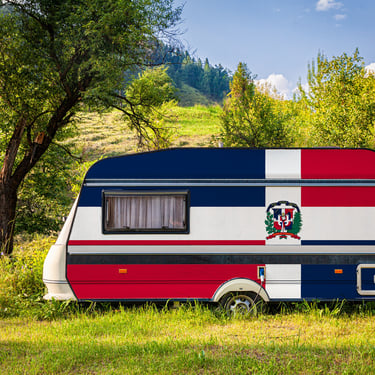
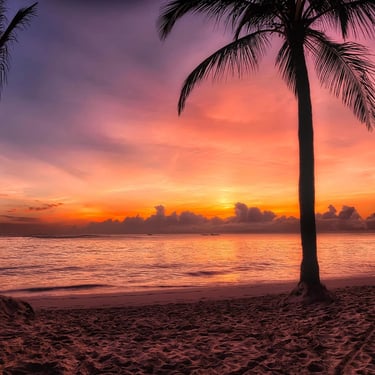
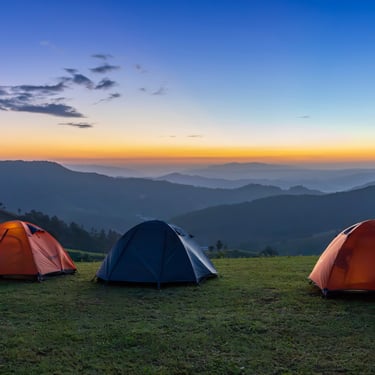
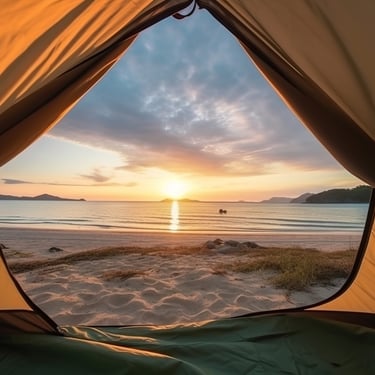
Camping in the Dominican Republic is a fun and affordable way to explore beaches, mountains, and nature. Use this guide to find the best spots, gear tips, and everything you need for a safe and easy adventure.
✅ Why Go Camping in the Dominican Republic?
1️⃣ Easy, Affordable, and Stress-Free
Camping is one of the simplest and most budget-friendly ways to enjoy the Dominican Republic’s outdoors.
Skip the strict resort schedules
Travel at your own pace, with no daily planning required
Wake up to ocean waves, birdsong, or fresh mountain air
Unplug from screens and reconnect with nature
2️⃣Breathtaking Natural Scenery
The Dominican Republic offers unforgettable camping spots, from beaches to mountains.
Barahona & Cabo Rojo: Camp right on the sand and catch sunrise over the ocean
Valle Nuevo National Park: Pine forests, cool mountain air, and trails near Constanza
Bahía de las Águilas & Montecristi: Remote, untouched beauty far from the crowds
3️⃣ From Rustic to Glamping
Choose your own adventure, go off grid or enjoy a little comfort.
Pitch a tent by a river or cliffside
Try eco glamping like treehouses in Samaná or beach bubbles near Puerto Plata
Many camps include hot showers, electricity, and meals
Some offer package deals with hikes, kayaking, or stargazing
4️⃣ Outdoor Fun for Everyone
Camping in the DR is all about active and memorable experiences.
Swim in natural pools or hidden waterfalls
Hike, birdwatch, or explore caves and jungle paths
Gather around a beach bonfire or gaze at a sky full of stars
Whether you are going solo, as a couple, or with your family, there is something for everyone.
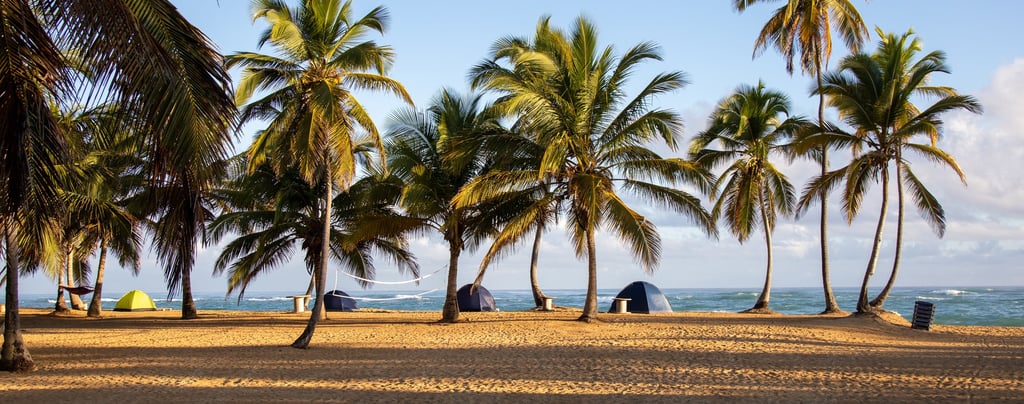

✅ Recommended Camping & Glamping Sites
We’ve handpicked some of the best outdoor stays across the Dominican Republic—whether you want to pitch a tent in the mountains, enjoy nature by the river, or relax in a fully furnished glamping bubble by the sea.
Lechuza River Camping
Location: San Cristóbal
Relax by the river in this quiet campsite with tent space and simple eco-shelters. A great spot for families and nature lovers.
Features: River swimming, wooden huts, natural setting
La Loma Camping
Location: Higüey
A budget-friendly mountainside camping site with beautiful views and space to bring your own gear or rent a tent on site.
Features: Mountain views, quiet setting, local hospitality
Recommended Glamping Sites
If you love nature but want real beds, private bathrooms, and comfort, these glamping spots are the best of both worlds.
EcoLodge Cueva de las Águilas
Location: Cabo Rojo, Pedernales
Wake up to ocean views from your beachfront tent. This glamping lodge includes fans, hammocks, and access to Bahía de las Águilas.
Features: Beachfront tents, fans, restaurant, boat tours
Eco Del Mar
Location: Playa La Cueva, Pedernales
This popular glamping site offers furnished tents, wooden cabins, beach service, and full meals—all right by the sea.
Features: Private beach, spa, all-inclusive feel
Green Land Bubble Glamping
Location: Sosúa, Puerto Plata
Experience a transparent bubble suite under the stars—complete with A/C, a private bathroom, and breakfast.
Features: Bubble domes, private bathroom, romantic setting
Ovalulu Glamping Hotel
Location: Barahona
Stay close to Laguna Cabral in furnished tents surrounded by greenery and silence.
Features: Private decks, eco-style comfort, lagoon nearby
✅ Camping Tips for the Dominican Republic
Camping in the Dominican Republic is a fun and affordable way to enjoy nature. Whether you want to camp by a river, in the mountains, or near the beach, these tips will help you stay safe and have a great time.
1️⃣ Choose a Safe and Reliable Campsite
Stick to places that are well known and approved for camping. Look for:
National parks like Valle Nuevo or Cotubanamá
Eco-lodges and designated campgrounds in areas like Jarabacoa, Miches, and Bonao
Private land with permission from the owner
These locations usually offer bathrooms, showers, staff support, and access to safe trails or rivers. Staying in a trusted area gives you peace of mind and fewer surprises.
2️⃣ Pick the Right Camping Style for You
There are different ways to camp in the DR. Choose what suits your comfort level and experience.
Beginner campers or families: Choose spots with toilets, water, and meals available
Experienced campers: Try more remote or off-grid locations, but come fully prepared and make sure it’s safe to do so
If you're not sure what to expect, go with a campsite that offers basic services and work your way up to more adventurous options.
3️⃣ Choose a Location That Matches Your Trip
The DR has camping options for every kind of traveler:
Jarabacoa and Valle Nuevo – Fresh mountain air, rivers, pine forests, and cooler temperatures
Miches and Bonao – Lush green landscapes, peaceful rivers, and easy road access
Bahía de las Águilas or Playa El Valle – Remote beaches where you can fall asleep to the sound of waves
Ask yourself: Do you want to hike, swim, relax, or explore? Choose your campsite based on the experience you’re looking for.
4️⃣ Check What the Campsite Offers
Before you go, check the services and rules of the place:
Are campfires allowed, or should you bring a stove?
Is there clean water, a bathroom, or a shower available?
Can you park your car nearby, or do you need to hike in?
Are meals, guides, or gear rental included?
Visit the official website, read online reviews, or call ahead to avoid surprises.
5️⃣ Read Reviews and Ask Around
Online reviews can tell you a lot about a campsite’s current conditions, including:
Safety
Road access
Cleanliness
Bugs and weather
Also, check travel forums or local Facebook groups for recent info. If you're already in the area, don’t hesitate to ask locals. Many Dominicans are friendly and might point you to a great nearby spot. Always ask for permission before camping on private land.
6️⃣ Pack the Right Gear
Camping gear is hard to find in the DR, especially in small towns. Bring everything you need, including:
A breathable tent with a rain cover
Sleeping mat or sleeping bag
Insect repellent and sunscreen
Flashlight or headlamp with extra batteries
Power bank for your phone
Cooler or food container
Small stove or grill
First aid kit
Lightweight clothes and one warm layer (for mountain camping)
Trash bags to keep the area clean
Plan your packing early and double-check your list before leaving.
7️⃣ Stay Safe and Check the Weather
The weather can change fast, especially in the mountains or near rivers.
Always check the forecast before you go
Avoid camping near rivers if heavy rain is expected
Set up your tent during daylight
Keep valuables out of sight and locked in your vehicle if possible
Let a friend or family member know where you're going and when you expect to return
If possible, camp with a buddy or group for added safety.
8️⃣ Respect Nature and Local Communities
Camping is a great way to connect with nature and local culture. Keep it positive for everyone.
Leave no trash behind
Keep noise to a minimum, especially at night
Do not damage trees, plants, or wildlife
Be respectful and kind to locals
Support the community by buying food, snacks, or souvenirs from local vendors
A little respect goes a long way, and it helps keep these places open and welcoming to other travelers.
✅ Camping FAQs for the Dominican Republic
1️⃣ Do I need permission to camp in national parks like Valle Nuevo?
Yes. For protected parks like Valle Nuevo, you need to request permission before camping. The government allows overnight stays only in certain areas, with rules for safety and nature protection.
You can request access by contacting the Ministry of Environment: www.medioambiente.gob.do
or through their official Facebook page: facebook.com/ambienterd
Some eco-camps in national parks handle permits for you, so always ask when booking.
2️⃣ Where can I get updated info or book a campsite?
There is no official national website for all campsites. Most bookings are made by contacting the campsites directly through WhatsApp, Instagram, or Booking.com.
3️⃣ How much does camping or glamping cost?
Basic camping: 10 to 20 USD per night for a space to pitch your tent
Eco camping: 25 to 45 USD per night, often with bathrooms and meals
Glamping: 90 to 120 USD per night for two people, with beds, lights, and breakfast included
4️⃣ What are the roads like to reach camping spots?
Valle Nuevo: You need a strong car or a 4x4. The road is steep and sometimes rocky
Cueva de las Águilas: Dirt road with some bumps but most cars can reach the entrance
Beach or mountain spots: Roads may become muddy or difficult after rain
Always ask your campsite about road conditions before your trip.
5️⃣ What kind of weather should I expect?
Mountain areas can be cold at night. Temperatures sometimes drop below 10 degrees Celsius
Coastal areas stay warm and humid all year
Rainy season is from May to November, and flash floods can happen near rivers
Check the weather before you go at: www.accuweather.com
6️⃣ Are there dangerous animals or bugs?
There are no dangerous wild animals, but you might see:
Mosquitoes and flies
Ants, especially if food is left out
Raccoons or stray dogs in rural areas. Read more.
Use insect repellent, keep food in sealed containers, and always shake out clothes or shoes in the morning.
7️⃣ Are there rules tourists might not know?
Yes. Here are a few important ones:
Campfires are not always allowed, especially during dry season
Loud music is not welcome in nature camps
Drones may be restricted in national parks
Beaches with sea turtles may not allow camping during nesting season
Always ask the campsite or park staff if you are not sure. Following the rules helps protect nature and local communities.
Start planning your trip today! Whether you’re bringing your own tent or booking a cozy glamping stay, this guide has simple tips and useful links to help you get ready with no stress.
But don’t stop here! To make the most of your trip:
✅ Explore the best excursions and things to do across the island
✅ Check out our complete packing list to get travel-ready
✅ Get travel insurance for extra peace of mind
Start planning now and turn your vacation into an unforgettable adventure!
Explore the Dominican Republic with DR Simplified – Your Viator Travel Shop!
Discover the best excursions, cultural experiences, and adventure tours in the Dominican Republic, all handpicked for travelers like you! Whether you're looking for stunning beaches, historical sites, or thrilling activities, our Viator shop offers top-rated tours with trusted guides. Book with ease and make your trip unforgettable!
Terms and Conditions © All rights reserved 2026
Affiliate Disclaimer
Some links on DR Simplified are affiliate links. If you make a purchase or booking, we may earn a commission at no extra cost to you. Thanks for your support!


